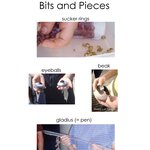
I must have missed that section in the What to Expect books on how to react when your child comes home from school with a Ziploc bag filled with squid parts in his backpack.
Thus begins an entertaining account by Beth Braccio in the Chicago Parent about all the exciting things her son has brought home from school. To her credit, she didn't immediately make him throw the bag of squid away:
I agreed to let the squid remains sit on our kitchen counter (bagged, of course), but after three days, the unwanted guest had to go. The kitchen was starting to smell like the dumpster…

